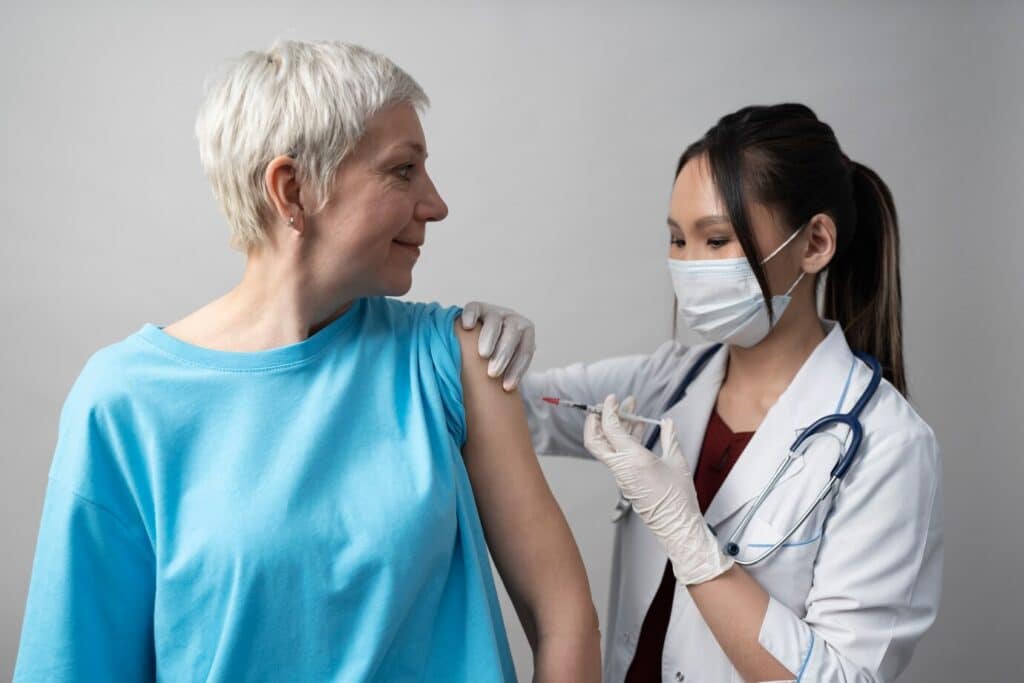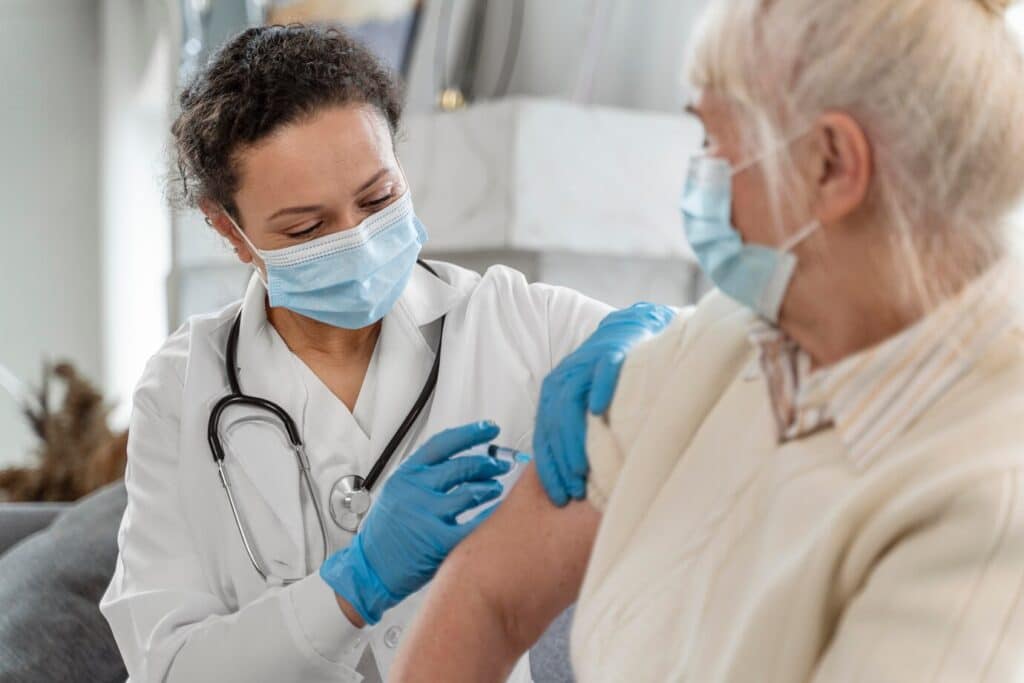Pneumonia Vaccination for Seniors: Key Facts You Should Know
As we age, our immune systems become more vulnerable to infections like pneumonia. For seniors, this illness can escalate quickly, often leading to hospitalization or severe complications. That’s why pneumonia vaccination for seniors is not just recommended—it’s a vital component of preventive healthcare.
Vaccines like PCV13, PPSV23, and the newer PCV20 offer protection against the most dangerous strains of pneumococcal bacteria. Understanding how often a senior should get a pneumonia shot, which vaccines are best suited, and what the side effects of the pneumonia vaccine are is crucial for making informed decisions. Seniors and caregivers alike should prioritize this preventive step and seek professional guidance when navigating vaccine options.
Why Pneumonia Vaccination Matters for Seniors
Older adults are more susceptible to respiratory infections, and pneumonia is among the most dangerous. Complications from pneumonia can include bloodstream infections, lung abscesses, and even death. The pneumonia vaccine for elderly individuals plays a significant role in reducing these risks and maintaining independence and quality of life.
Vaccines like PCV13 and PPSV23 are commonly used and recommended. They are proven to lower the incidence of serious pneumococcal disease, particularly in those 65 and older. By reducing disease transmission, the pneumonia shot for seniors also helps protect the broader community. For additional senior health information, visit Westmont of Morgan Hill.
Understanding the Vaccine Options and Schedules
Several vaccines are available to prevent pneumonia. Most commonly used are PCV13 (Prevnar 13), PPSV23 (Pneumovax 23), and the newer PCV20 (Prevnar 20), which provides coverage for 20 strains. The frequency of pneumonia shots for seniors depends on the vaccine they’ve already received and their underlying medical conditions.
Generally, the CDC recommends:
- PCV20 alone or a combination of PCV15 followed by PPSV23 for adults 65 and older.
- A second dose of PPSV23 may be recommended five years after the first in high-risk patients.
Consult your healthcare provider to determine your ideal vaccine schedule. Many seniors are unaware of the differences between vaccines and whether they need boosters, making routine medical check-ins critical.
Learn more about elderly care and health planning from this comprehensive guide for caregivers.
What Are the Side Effects of the Pneumonia Vaccine?
It’s natural to ask, what are the side effects of the pneumonia vaccine before receiving it. Most seniors experience only mild effects, such as:
- Redness or soreness at the injection site
- Mild fever
- Fatigue or muscle aches
These side effects usually resolve within a couple of days. In rare cases, individuals may experience allergic reactions, which is why informing your healthcare provider of any pre-existing allergies or sensitivities is essential. Knowing the facts about the pneumonia vaccine for elderly populations can help overcome hesitancy and ensure seniors get the protection they need.
For context, combining flu and pneumonia vaccinations can further reduce the chance of serious illness. Read more about how influenza affects seniors and why dual protection matters.
New Advancements in Pneumonia Vaccines
The introduction of PCV20 marks a significant advancement in pneumonia prevention. Approved by the FDA in 2021, this vaccine combines protection from multiple strains into a single shot. For many, this eliminates the need for separate PCV13 and PPSV23 doses.
PCV20 is a powerful option in pneumonia vaccination for seniors, offering broader protection and greater convenience. It’s covered under Medicare Part B when administered by a qualified provider. Many private insurance plans also cover it fully, but it’s best to confirm your benefits in advance.
Community healthcare teams like those at Westmont can help coordinate your vaccination needs. Learn more about navigating health care in assisted living to ensure you’re accessing all available resources.

Who Is Eligible and How to Access the Vaccine
If you’re 65 or older, you’re automatically eligible for the pneumonia shot for seniors under Medicare Part B. Those with certain chronic illnesses or compromised immune systems may qualify even earlier. Discussing your complete health history with your doctor will help determine the right schedule.
Wondering how to get a pneumonia shot if you’re on a fixed income? Most public health clinics offer free or low-cost options, and Medicare covers 100% of the cost if you meet the eligibility criteria.
For seniors who reside in communities like Westmont, vaccination coordination may already be part of the wellness program. Visit Vaccines for Seniors to learn how senior communities promote preventive healthcare.
How Often Should a Senior Get a Pneumonia Shot?
The frequency of vaccination is a common concern. So, how often should a senior get a pneumonia shot? The answer varies based on the vaccine:
- PCV13: Typically administered once
- PPSV23: May be given more than once, depending on risk factors
- PCV20: One-time shot offering long-term protection
Booster doses may be necessary in certain cases, such as those with chronic kidney disease, undergoing cancer treatments, or having an immunocompromised state. Keep vaccination records handy and discuss any changes in your health with your doctor to adjust your schedule accordingly.
Building a Healthier Future Through Prevention
Staying proactive about vaccination is one of the best ways to support aging gracefully. Beyond the pneumonia vaccine, seniors should stay updated on other immunizations, such as shingles and influenza. Preventive care, like pneumonia vaccination for seniors, reduces medical emergencies and helps you maintain an active lifestyle well into your later years.
Accessing community wellness programs, engaging in regular physical activity, and maintaining a nutritious diet also enhance immunity. Here are a few helpful resources to support your wellness journey:
These resources offer up-to-date information and tools to help seniors stay protected and informed.
Make Pneumonia Prevention a Priority
Protecting your health with the pneumonia vaccine is a smart, proactive step toward a longer, healthier life. Knowing what the side effects of the pneumonia vaccine are, how often a senior should get a pneumonia shot, and the latest developments in pneumonia vaccines for elderly options gives you the confidence to take action.
Take the next step by speaking with your healthcare provider, reviewing your Medicare benefits, and exploring vaccination options available in your area. Whether you live independently or in a community like Westmont of Morgan Hill, you deserve access to excellent preventive care.
For more information, support, or to schedule a tour of Westmont of Morgan Hill, call 408-779-8490 or visit: Schedule a Tour. Their dedicated team is ready to help you achieve a vibrant and healthy lifestyle.
Discover the level of care you or your family member requires. What Level of Care Do You Need?
Frequently Asked Questions
How many doses of the pneumonia vaccine are required after age 65?
Most seniors age 65 and older are recommended to receive one dose of PCV20 or a series of PCV15 followed by PPSV23 at least one year later. The exact number of doses depends on your vaccination history. If you’ve previously had a pneumococcal vaccine, your doctor may adjust the schedule. It’s best to consult a healthcare provider for personalized guidance.
Are there any side effects to the pneumonia vaccine for seniors?
Yes, some seniors may experience mild side effects like redness, swelling, or soreness at the injection site. Others might have fatigue, low-grade fever, or muscle aches. Serious side effects are rare but should be reported to a healthcare professional. These symptoms usually resolve within a few days.
Who is eligible for the pneumonia vaccine?
The pneumonia vaccine is recommended for adults aged 65 and older, and for younger individuals with certain health conditions or weakened immune systems. People with chronic diseases such as diabetes, heart disease, or lung conditions also qualify. Your healthcare provider can confirm your eligibility based on your medical history.
How often should a senior have a pneumonia vaccine?
Seniors typically need just one pneumonia vaccine after age 65, either PCV20 or a combination of PCV15 and PPSV23. However, if previously vaccinated with an older version or before age 65, a follow-up dose may be needed. Timing varies, so consult with your doctor to ensure you are up to date.








